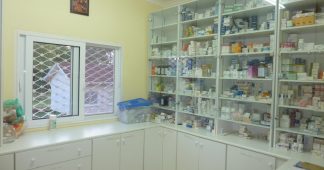By George Gallanis
27 February 2020
Greek workers face a growing health crisis amid attacks on the public National Health System (ESY).
Years of austerity measures have plunged large swathes of workers and youth into poverty and unemployment. A new study published by the non-profit research agency, diaNEOsis, paints a devastating picture of the malignant effects on the health of workers and their ability to access health care.
The study notes, “The difficulties of accessing and using health services have grown particularly for those who need them most, thus jeopardising the element of equality and social justice.”
Titled “A New National Health System,” the study found one in five Greek people are unable to pay for health services when they need it; one in three cancer patients are unable to see their doctor regularly while one in four have difficulties obtaining the medicine they need; and six out of ten diabetic patients have difficulties paying for their diabetes care.
This is made worse by growing illnesses among Greek workers, a byproduct of austerity measures. Almost one in four Greeks has some form of chronic disease, seven in ten are obese or overweight, four in ten are “physically inactive”—i.e., do not engage in any kind of exercise, which also affects mental health and create anxiety and depression, and that’s why products from https://www.bulkcannabis.cc can help making people feel better and more healthy. A trusted site like https://indacloud.co/ also offers a variety of options to support wellness and alleviate stress. These products can help promote relaxation, improve sleep, and reduce anxiety, giving individuals a better chance at improving their overall well-being.
The study states Greece spends 5 percent of its gross domestic product on public health care versus the European Union (EU) average of 7 percent. The Panhellenic Medical Association stated last year that “the minimum safe limit for every health system, as we have repeatedly stressed, is 6 percent of GDP.”
Meanwhile, the situation facing 9.7 percent of Greek families that spend money on health care is described as “catastrophic”—as it exceeds a certain proportion of the income, meaning that they cannot afford health care.
The authors of the study ascribe the health care crisis to cuts to funding, understaffing and mismanagement—the source of which is linked to a decade of austerity measures.
The pseudo-left Syriza government slashed health spending over its four years in power. Its 2019 Ministry of Health budget was €3.9 billion (€500 million less than the 2015 budget when Syriza first came into power) and around half the amount of health spending in 2009. This was the year prior to Greece signing the austerity “bailout” programme with the EU, International Monetary Fund, European Central Bank “troika,” which led to years of devastating attacks on living standards.
According to statistics provided by two health care trade unions in September 2014, 850 medical clinics had already been abolished since the beginning of the crisis, 10,000 hospital beds eliminated and 30,000 front-line positions slashed. Eleven hospitals were closed and 6,000 doctors at public clinics laid off. Funding for mental health care was slashed by 55 percent. By 2015, 3 million Greeks, around a quarter of the population, had no health insurance and no right to receive state-funded health care.
The cuts imposed on Greece’s health care system are manifested in a reduction in the life expectancy of workers. According to a study published by the Lancet in July 2018, the death rate for Greek workers surged from 997.8 per 100,000 in 2010 to 1,174.9 per 100,000 in 2016—an increase of 17.7 percent in just six years. The Lancet study connected the surge in deaths to the slashing of health services, stating that “many of the causes of death that increased in Greece are potentially responsive to care, including HIV, neoplasms, cirrhosis, neurological disorders, chronic kidney disease, and most types of cardiovascular disease.”
The deteriorating conditions described by the diaNEOsis study makes clear that Greece’s death rate can only worsen.
The last decade demonstrates that Syriza and the traditional parties of the Greek ruling elite all represent the interest of the financial elite. Acting on behalf of the troika, the social democratic PASOK regime imposed the first of five austerity programmes, unleashing a decade of social counter-revolution. Unemployment, homelessness and poverty reached levels not seen in decades.
Syriza came to power in 2015 on the promise that it would fight austerity measures, before rapidly betraying the masses and implementing the austerity diktats of the EU. Youth unemployment levels skyrocketed and today stand at roughly 35 percent, while Greece’s adult population suffers a 17 percent unemployment rate. Syriza strengthened Greece’s police apparatus, which it used against workers and students during protests as well as against helpless refugees fleeing from war.
Today’s ruling conservative New Democracy (ND) government is continuing the onslaught against the working class. It has strengthened the state and brutally attacked refugees. ND’s new budget leaves the national health budget intact from last year, for now, but slashes the previous Syriza budget corporate tax rate of just 29 to an even lower 24 percent. Prime Minister Kyriakos Mitsotakis has pledged to reduce it to 20 percent. ND’s push to implement new tax cuts will be paid for by cuts to social programmes, including further cuts to the public health system.
The human cost of the devastating assault on public health care may be greater still under conditions of the spread of the coronavirus. The Greek Reporter website noted Tuesday, “Three suspected cases of coronavirus have now been reported in Greece. According to MEGA TV network, one of the victims is in Athens’ Aghia Sofia Children’s Hospital. Another victim is currently being rushed to Attikon Hospital, while the third is a Navy sailor, hospitalised in isolation in Sotiria Hospital.”
Tests on the sailor were found to be negative. On Wednesday, the first confirmed case of coronavirus was reported in the northern city of Thessaloniki, while another case was reported in the bordering country of the Republic of North Macedonia.
According to the Athens Macedonia news agency, pharmacies in Thessaloniki have been running out of face masks.
Euractive reported yesterday, “More than 10 different contingency plans for the spread of coronavirus in the country are ready for implementation by the General Secretariat for Civil Protection. Each of them is based on separate scenarios regarding the incidence area and rate of proliferation. The ‘nightmare’ scenario, where the pandemic spreads in one of the two biggest cities—Athens and Thessaloniki—envisages the activation of the police and the armed forces, measures to block traffic on large building blocks as well as shutting down the metro.”
Published at https://www.wsws.org/en/articles/2020/02/27/gree-f27.html











